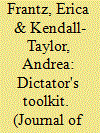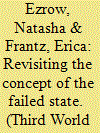|
|
|
Sort Order |
|
|
|
Items / Page
|
|
|
|
|
|
|
| Srl | Item |
| 1 |
ID:
186377


|
|
|
|
|
| Summary/Abstract |
The Biden administration came into office seeking to create a stable and predictable relationship with Russia. Determined to devote more time and attention to China, Washington sought to reduce tensions with Putin’s Russia in order to avoid confrontation that might derail the administration’s agenda. Yet despite Washington’s approach, relations with Russia have turned out to be anything but stable and predictable. On February 24, 2022, Vladimir Putin launched a full-scale invasion of Ukraine. Putin's war of choice catalyzed a massive shift in international perceptions of Putin and a series of responses—ranging from punishing sanctions on Russia’s financial sector to private sector steps to curtail business operations inside the country—that have fundamentally altered relations with Russia. It is now impossible to imagine that there could be any substantive improvement in US-Russia relations while Putin remains in power.
|
|
|
|
|
|
|
|
|
|
|
|
|
|
|
|
| 2 |
ID:
132972


|
|
|
|
|
| Publication |
2014.
|
| Summary/Abstract |
When the leader of an autocratic regime loses power, one of three things happens. The incumbent leadership group is replaced by democratically elected leaders. Someone from the incumbent leadership group replaces him, and the regime persists. Or the incumbent leadership group loses control to a different group that replaces it with a new autocracy. Much scholarship exists on the first kind of transition, but little on transitions from one autocracy to another, though they make up about half of all regime changes. We introduce a new data set that facilitates the investigation of all three kinds of transition. It provides transition information for the 280 autocratic regimes in existence from 1946 to 2010. The data identify how regimes exit power, how much violence occurs during transitions, and whether the regimes that precede and succeed them are autocratic. We explain the data set and show how it differs from currently available data. The new data identify autocratic regime breakdowns regardless of whether the country democratizes, which makes possible the investigation of why the ouster of dictators sometimes leads to democracy but often does not, and many other questions. We present a number of examples to highlight how the new data can be used to explore questions about why dictators start wars and why autocratic breakdown sometimes results in the establishment of a new autocratic regime rather than democratization. We discuss the implications of these findings for the Arab Spring.
|
|
|
|
|
|
|
|
|
|
|
|
|
|
|
|
| 3 |
ID:
132348


|
|
|
|
|
| Publication |
2014.
|
| Summary/Abstract |
A dictator's motivation for using repression is fairly clear, but why some repress more than others or favor particular types of repressive strategies is less obvious. Using statistical analysis, this article demonstrates that a dictator's reliance on co-optation fundamentally alters how repression is used. Specifically, it finds that co-optation through the use of political parties and a legislature creates incentives that lead dictators to decrease empowerment rights restrictions, like censorship, while increasing physical integrity rights violations, like torture and political imprisonment. This occurs because, by creating parties and a legislature, a dictator draws his potential opposition out of the general public and into state institutions, making it easier to identify who these opponents are, to monitor their activities, and to gauge the extent of their popular support. This reduces the need to impose broad types of repressive measures, like empowerment rights restrictions, that breed discontent within the overall population. At the same time, co-optation creates the risk that rivals, once co-opted, will use their positions within the system to build their own bases of support from which to seek the dictator's overthrow, generating incentives for dictators to increase physical integrity violations to limit the threat posed by these individuals.
|
|
|
|
|
|
|
|
|
|
|
|
|
|
|
|
| 4 |
ID:
176444


|
|
|
| 5 |
ID:
156956


|
|
|
|
|
| Summary/Abstract |
Globalisation, shifting power dynamics and the growing availability of the internet and other communication technologies have significantly changed the environment in which autocrats operate. Some observers have concluded from these changes that citizens now hold the upper hand, and that dictators’ days are numbered.1 The centralisation of power, according to this argument, is a requisite of dictatorship. In a world in which power is diffusing across NGOs, corporations, and wealthy and technology-empowered individuals, dictators will soon find themselves unable to build and maintain the power needed to uphold their repressive systems of rule.
|
|
|
|
|
|
|
|
|
|
|
|
|
|
|
|
| 6 |
ID:
133775


|
|
|
|
|
| Publication |
2014.
|
| Summary/Abstract |
Because autocrats can rarely be voted out of power, most find themselves exiting office in far less conventional ways. Since the 1950s, the coup d'état-or the illegal seizure of power by the military-has been by far the most common.1 During the 1960s and '70s, for example, about half of all autocrats who lost power did so through a coup. But fast-forward to the 2010s, and a different picture is emerging. The chain of protests during the Arab Awakening, which toppled four of the world's longest-standing rulers-Zine al-Abidine Ben Ali of Tunisia, Hosni Mubarak of Egypt, Muammar Qaddafi of Libya, and Ali Abdullah Saleh of Yemen-led many political observers to rejoice in the masses' ability to unseat autocratic strongmen. But are these revolts evidence that autocrats are becoming increasingly vulnerable to the masses? Or are they short-term exceptions to a longer-standing rule of autocratic ouster?
|
|
|
|
|
|
|
|
|
|
|
|
|
|
|
|
| 7 |
ID:
136631


|
|
|
|
|
| Summary/Abstract |
Democracy has suffered eight straight years of global decline. This was the finding Freedom House issued in its 2014 report examining the state of global political rights and civil liberties.1 This downward slide in political freedom has been the longest continuous decline in political rights and civil liberties since the watch-dog organization began measuring these trends over 40 years ago.
Some of this backsliding has occurred in democratic countries like Hungary, where Prime Minister Viktor Orban publicly declared the end of liberal democracy as he continued to undermine the media, the judiciary, and other key institutional checks on executive power following his election in 2010. Or in Turkey where President Recep Tayyip Erdogan has dismantled checks on his power, censured opponents, and limited critical media, particularly in the last two years. However, a good deal of the deterioration globally has occurred within the subset of states we would consider to be non-democracies. From Egypt to Russia to Venezuela to Thailand, autocratic incumbents are expanding their control over the levers of power.
|
|
|
|
|
|
|
|
|
|
|
|
|
|
|
|
| 8 |
ID:
124181


|
|
|
|
|
| Publication |
2013.
|
| Summary/Abstract |
The policy and donor communities have placed great importance on fixing 'failed states'. World leaders have cited failed states as one of the greatest threats to the global community. Nevertheless the concept of the failed state is currently subject to a backlash from the academic community. Scholars have criticised the failed states literature on theoretical, normative, empirical and practical grounds. We provide a brief overview of these main concerns and offer a more systematic method for measuring 'state failure'. Coming up with better ways of assessing how states underperform will enhance our understanding of how institutional decay affects stability and development and, most importantly, will provide an improved system of early warning for practitioners.
|
|
|
|
|
|
|
|
|
|
|
|
|
|
|
|
| 9 |
ID:
108350


|
|
|
|
|
| Publication |
2011.
|
| Summary/Abstract |
Nominally democratic institutions such as political parties and legislatures are common in dictatorships, which rely on them to maintain control of the state. Parties and legislatures provide a means through which dictatorships co-opt potential opponents, distribute rents to supporters and mitigate elite conflicts. Indeed, regimes with these institutions have longer tenures than those without them. Using evidence from postwar dictatorships, this study demonstrates that parties and legislatures also enhance the ability of authoritarian regimes to withstand leadership transitions. Transfers of power are inherently destabilizing. Yet we find that dictatorships with parties and legislatures are far less likely to be associated with instability because these institutions insulate regimes from the disruptive effects of unconstitutional leadership transfers.
|
|
|
|
|
|
|
|
|
|
|
|
|
|
|
|
|
|
|
|
|